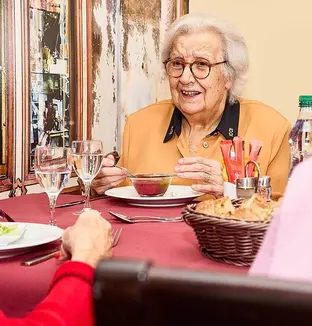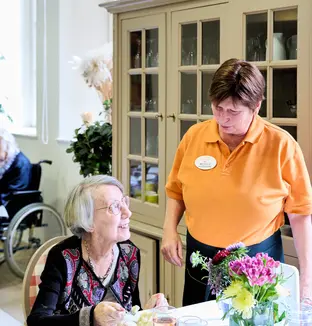Catering in nursing homes: a major health issue
Meals are a special time of life, synonymous with conviviality, sharing and pleasure. It contributes to maintaining good physical and mental health. Catering is a key issue for vulnerable people who are at high risk of malnutrition. We take a look at the role of nutrition in the medical and nursing care provided in our ‘homes for the elderly’.
Eating well: the start of good health
In 2022, 40 million meals were served in the Group's establishments, including around 17 million in France. Our kitchen teams, with the advice and support of our dieticians, create menus that meet three objectives: nutrition, pleasure and food safety. All while taking into account the tastes, dietary particularities and specific therapeutic diets of each resident. This is a real public health issue, as well as a matter of personalizing needs. A poor diet can lead to reduced resistance to infection, reduced muscle mass and, consequently, an increased risk of falls. The consequences for the elderly can be serious, with the risk of hospitalization and increased dependency. Ensuring that every resident eats properly is not only the basis of their physical health, but also of their well-being and enjoyment of life on a daily basis.
Listen, adapt, audit
In 2022, in France,emeis held the “États Généraux du Grand Age”, a meeting of all its stakeholders at its facilities. This was an opportunity for them to reaffirm the need to pay even greater attention to meals, in terms of both pleasure and nutrition. One of the key requests was to be able to benefit from local products linked to the region in which the establishment is located.
- In 2022, the Group is working on its catering policy to take into account the aspirations of residents, patients and their families, as well as those of the kitchen teams.
- In France, for example, the food purchasing budget has been increased by 30% between 2021 and 2023, notably by increasing the proportion of organic and locally sourced products.
- This year, a permanent survey system will be deployed in France's nursing homes to ensure that the necessary attention is paid, and that improvement actions are taken as close as possible to the need.

Fighting undernutrition
In France, a food plan is implemented to meet the nutritional requirements of each resident. It incorporates the recommendations of the Agence nationale de sécurité sanitaire de l'alimentation, de l'environnement et du travail (ANSES), the Plan national nutrition santé (PNNS) and the Groupement d'études des marchés en restauration collective et de nutrition (GEMRCN), to guarantee the right proportions to be served according to the type of population catered for, as well as the variety of dishes to ensure a balanced diet. The proposed plan thus guarantees variety and dietary balance throughout the seasonal menu cycles, and ensures that the necessary protein and calorie requirements are met. Since the beginning of 2023, menu displays have included average energy (Kcal) and protein (g/day) intakes, to ensure compliance with current recommendations.
Personalization and supervision
An initial assessment and adaptation of meals are established to define a personalized nutritional program. This is defined by the care team for each resident or patient, according to their needs and tastes, detecting any risks of undernutrition and adapting textures and diets. Food intake and hydration are monitored by the medical and nursing teams, with frequency adapted to the needs and pathology of each resident or patient. In France, rigorous monitoring of undernutrition involves monthly weight checks for all residents, and may be more frequent for undernourished residents. Hospitality chefs can modify menu items to incorporate entertainment, resident favorites, substitute less popular recipes, or integrate regional recipes. This is subject to compliance with the food plan and vigilance with regard to the diversity of the dishes offered.
Menus can be adapted to therapeutic diets on medical prescription. Meals can also be offered in a variety of textures, depending on the individual's needs.
Kitchen teams are also trained in the challenges of undernutrition in the elderly. In France, 187 training sessions were organized for these teams in 2022.

As you can see, catering is a major component of the medical-care project. emeis is committed to taking into account the opinions of residents. Satisfaction surveys measure their level of satisfaction with meal quality. In France, Belgium, Spain, Switzerland, Germany and Italy, we have set up dialogue forums dedicated to catering.
